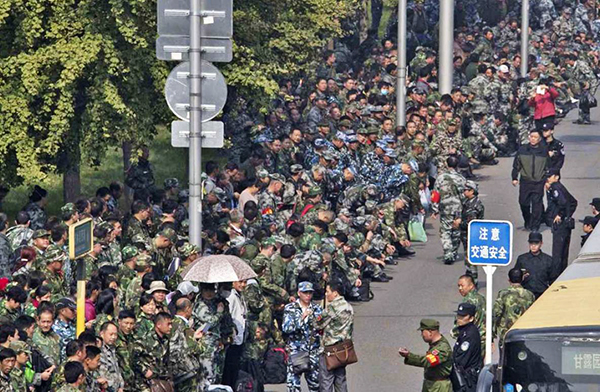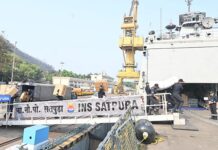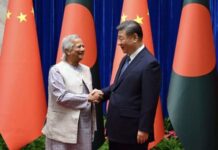
The Trump administration has employed China-born individuals, who know the inside-out working of the CCP, as advisers to create a gameplan to effectively combat China at its own game, by using Beijing’s shrewd political strategies against itself and exploiting its weaker points. Among them is Yu Maochun, professor of East Asia and military history at the US Naval Academy. Yu is a first-generation immigrant and has close ties with Chinese dissidents. US Assistant Secretary of State for the Bureau of East Asian and Pacific Affair David R. Stilwell called Yu as a “national treasure” of the US.
Another China-born US citizen Mung Chiang, a tech entrepreneur and dean of the college of engineering at Purdue University, is the foreign policy adviser of secretary of state, Mike Pompeo.
In August 2019, the White House appointed Elnigar Iltebir, a prominent Uygur-American academic as the US National Security Council’s director for China.
Global Times, the mouthpiece of CCP has published op-eds criticizing Yu and Mung. The newspaper dubbed Yu as a hostile “fanatic” who wants to see the downfall of the Chinese Communist Party.
Opposition From PLA
The Chinese Communist Party (CCP) General Secretary, Xi Jinping is facing backlash from its armed wing- the People’s Liberation Army (PLA), which seems to have turned against the CCP.
PLA Generals are, therefore, furious about Xi Jinping’s ongoing wars with the diplomatic world. PLA understands that these companies are losing out, not because of PLA links but because Xi Jinping’s CCP is engaging countries like India, the US and Australia in endless battles.
Two PLA hawks – retired Major General Qiao Liang and a serving PLA Air Force Senior Colonel Dai Xu – have been vocal against the CCP.
Qiao is the author of a book called “Unrestricted Warfare”, in which he had laid down a game-plan to defeat USA. Interestingly, he had suggested exporting a virus to create a Pandemic. But, lately, he warned Xi Jinping against any plans to take Taiwan by force. Qiao has cited logistical reasons while warning against an aggressive move in Taiwan. He felt that the Dragon’s maritime routes at the South China Sea could get blocked, in a likely reference to the Strait of Malacca. He has also warned that an aggressive move in Taiwan could prompt the US to declare war on China and Qiao has also stated that Western sanctions would hurt China’s economic development.
Dai Xu seems even more critical about the CCP. In an article titled, “2020, Four Unexpected Things and Ten New Understandings About the United States.” Xu has given a brutal reality check to the CCP about the American ability to inflict costs on China.
Dai Xu feels that China has no friends left within the US. Xu wrote that both the Republians and the Democrats were surprisingly unanimous on a major trade policy, which really hurts all Chinese people.
ALSO READ HONG KONG: China Adopts Decision on National Security Law
The top brass of the PLA has many reasons to be angry with the CCP. Top Chinese companies like Alibaba, Tencent, Huawei, Xindia Steels Limited, Xinxing Cathay International Group, Chinese Electronics Technology Group Corporation, and SAIC Motor Corporation Limited have PLA links. Top Chinese Generals enjoy a lot of influence over these companies.
Rumblings Within the Military
The brutal one-child policy of China has given rise to a sub-standard military force. The Chinese families, including those of PLA officers/troopers are very emotional about their child, since there’s only one. Within the PLA families, there is a lot of resentment about Xi Jinping and CCP’s expansionist push.
The PLA families are not ready to sacrifice their children at the altar of CCP’s hunger for territory of other countries. The same sentiments are getting reflected in the remarks of Qiao Liang and Dia Xu. The PLA hates the CCP and there are growing signs of mutiny from the armed wing of the Chinese Communist party.
There are other issues involved with PLA too. The veterans are deprived of pensions, jobs and other benefits. Mysterious deaths of PLA veterans protesting against such issues is said to be a regular feature in China. And then, of course, there are sociological issues involved with the PLA.
Galwan Clash
Xi Jinping’s Himalayan blunder got far too many PLA troops slaughtered in the Galwan Valley area. Within China, the PLA casualty figures were not released, nor were the dead given any military honours/ memorial service. This has driven the PLA further away from the CCP.
After the Galwan Valley bloodshed, Jianli Yang, a Chinese dissident and the son of a former Chinese Communist Party (CCP) leader wrote, “Retired and hurt PLA veterans could become a force against the Chinese Communist Party regime”. He added, “the CCP leadership cannot afford to undermine the veterans’ potential to launch a collective and “armed” anti-regime action.”
Liberal Voices Silenced
Cai Xia, a the former professor at the Central Party School of Beijing, was expelled in August 2020, after an online recording of her criticism of President Xi’s policies leaked online. In this, she described President Xi as a “mafia boss” and accused him of provoking conflict with other countries such as India to divert the attention of the Chinese public from domestic economic and social tensions. In an interview with the Guardian, she went further, blaming President Xi for “killing a party and a country” and turning China into “an enemy” of the world.
There had been a handful of other vocal liberal voices too such as the law professor Xu Zhangrun and property developer Ren Zhiqiang, promptly axed after they criticised Xi or his handling of the coronavirus. Ren now also faces an investigation on corruption charges. Cai has suggested there were others in China’s communist party waiting for the tide to turn.
ALSO READ Editorial: China’s Self-Defeating Aggressive Moves
Rival Faction
Xi, who amended the party constitution to let him continue as China’s President indefinitely, has to contend with the rival faction of CPC – the Communist Youth League (CYL). The CYL has traditionally been an important domain from where the CPC picks up its cadres, many of them rising to senior positions in the party.
Often referred as the Zhejiang faction, a reference to the eastern, coastal province Xi was party secretary of for several years before he reached Beijing. Hu Chunhua, currently a Vice Prime Minister part of the 25-member Politburo and Prime Minister Li Keqiang, are the face of the CYL faction that is battling President Xi.
The faction fight has been building up but may be some distance from an inflection point.
Economic Problems
A domestic market collapse is possible, which will force Xi to take a few more hasty decisions. China’s banking regulator has advised its banks to be prepared for sharp rises in bad loans once the Corona moratorium period is over. Three Chinese banks have collapsed in the last three years and 15 per cent of the financial sector is supposedly past a high risk stage. Tax revenues have grown under five per cent and budget deficits exceed 11 per cent. The season of discontent for 1.4 billion Chinese has arrived.
China created the Belt & Road Initiative (BRI) to use the surplus capacity in its construction materials and equipment sector and keep Chinese labour occupied. Experts estimate that this project needs another $5 trillion over the next five years. The money given to 150 countries cannot be recalled. China’s $10 trillion foreign debt is realistically supported by $2 trillion of reserves. With the balance of trade going negative, Chinese supporters are nervous. If China’s trading partners do not agree to settlements denominated in the RMB, a run on the currency is highly possible.
Xi Jinping Under Pressure
Xi Jinping is under domestic and international pressure. He has undoubtedly been unnerved by the persistent criticism by senior communist cadres. Crucial to his efforts to diffuse, if not eliminate, opposition is ensuring the loyalty of China’s ubiquitous public security apparatus that has a presence throughout the country down to each village and urban neighbourhood. Xi Jinping has turned his attention to ensuring the loyalty of the apparatus.
In July, he unleashed a year-long ‘rectification’ campaign to ‘protecting’ the Central Committee, which is the ‘core’ of the CCP, with Xi Jinping at its ‘core’ and ‘protecting’ his position. These are now referred to as the ‘two safeguards’. The campaign’s focus will be on weeding out ‘two-faced’ cadres on charges of violation of party discipline and corruption. It is apparent that the ‘loyalty’ of many in the security setup continues to be doubted.


















[…] Troubles Mounting for Xi Inside China […]